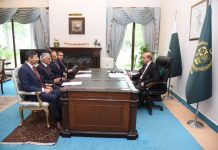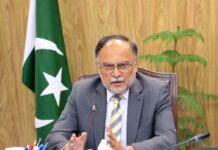ISLAMABAD: Former president and Pakistan People’s Party (PPP) Co-chairman Asif Ali Zardari on Monday announced his party’s nine recommendations for an extension to the operation of military courts.
The military courts had been disbanded this year on January 7th after a sunset clause under which the tribunals were established expired.
No consensus was reached between the government and the opposition on an extension to their tenure despite frequent meetings on the issue.
On February 28th, however, the majority of the political parties in power consented to an extension for another two years. The meeting, however, was not attended by leaders of the PPP, who had earlier called a multi-party conference on March 4th to discuss the matter with other politicians.
Addressing a press conference in Islamabad, Zardari clarified that his party was “providing recommendations [for], not opposing [an extension to] military courts.”
“We want a law that defines terrorists… that will become a definition of terrorism,” he added. The PPP leader said that suspects held in connection with terrorism cases should be produced within 24 hours of their arrest.
“Our aim is not to dishearten our armed forces… We are making it clear to the government that we are with the Pakistan Army… The PPP has been fighting terrorists and will continue to fight them.”
The former president said his party intended to present the points for eventual parliamentary discussion. “I hope all political forces are present for this parliamentary discussion. We are open to dialogue [on the points], whether with the government or the army,” he said.
He added that the party had provided a year’s time to assess the law, and that the PPP intended to pressure the government to strengthen witness protection in Sindh and disburse funds to the provinces and judiciary for more effective implementation of the National Action Plan (NAP).
Slamming the government over its alleged failure regarding the implementation of the NAP, he said, “The government has money to build roads and infrastructure but not for the NAP. I think there are weaknesses [in NAP] because the government is not serious and they have not provided them the funds,” he claimed.
Finance Minister Ishaq Dar, responding to the PPP’s announcement, said the government would examine the points and provide copies of the recommendations to all political parties.
“There was a consensus earlier on a two-year [extension to military courts],” Dar said, “But the PPP has suggested only a year’s extension. We will sit tomorrow or day after and discuss them,” he added.
“Because there are new recommendations now, we will have to examine them,” Law Minister Zahid Hamid said. “The clerical amendments shouldn’t be an issue, and through discussion with all political parties we will try to reach a consensus on this again.” Military courts have been an issue of conflict between the government and the opposition. The primary concern of critics is the mystery surrounding military court trials: no one knows who the convicts are, what charges have been brought against them, or what the accused person’s defence is against the allegations levelled against them.
Nine recommendations
1. Military courts shall be presided over by a sessions judge or additional sessions judge along with a military officer
2. The sessions/additional sessions judge will be nominated by CJP
3. Period of extension will be one year from starting date
4. Right of judicial review by high courts under Article 199 of the Constitution
5. High court shall decide case within 60 days.
6. Accused will be produced within 24 hours before court
7. Accused will be supplied with grounds of arrest within 24 hours
8. Accused shall have right to engage counsel of his choice
9. Provisions of Qanoon-e-Shahadat 1984 shall apply














